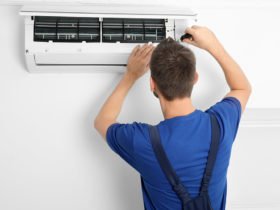Is your home loan an FHA loan? FHA loans are a great way to buy a home with a lower down payment. However, maintaining your FHA loan can cost you more in private mortgage insurance. If you have equity built up in your home, consider refinancing. You can lower your mortgage rates and remove mortgage insurance with a conventional loan refinance.
If you are looking to pay less over the life span of your home loan, read on to learn how FHA and conventional loans differ and how refinancing can save you money. Follow these tips and get started on making the switch today.

FHA Loan
How do FHA loans and conventional loans compare to each other? Before learning how to refinance, it’s important to understand how these loan options differ and which is right for your unique needs.
What is an FHA loan? A Federal Housing Administration (FHA) loan is a home mortgage insured by the government. Borrowers apply directly to a credit union, bank, or other qualifying lenders for this loan. An FHA loan is intended to help those who otherwise find it difficult to qualify for a private loan. Circumstances may have led to lower credit scores or the inability to make a down payment. This affordable loan is a great option for first-time homebuyers.
However, lenders consider FHA borrowers more of a risk. The risk of a borrower defaulting on a loan means a lender needs to be able to recoup these costs if necessary. Private mortgage insurance (PMI) and higher interest rates act as insurance to the lender. Though you can buy a home with little to no down payment, this risk means you may pay more in PMI and interest.
Conventional Loan
Unlike an FHA loan, a conventional loan is not backed by a federal agency. Since these loans are not guaranteed by the government, they have stricter lending standards and can be harder to qualify for. Usually, you can take advantage of a conventional loan if you have a good credit score and can make a down payment. While a 20 percent down payment is the standard for a conventional loan, lenders sometimes accept less. Since you are less risk to a lender, you can qualify for better rates and often avoid PMI. With a conventional loan, you save money overall and may pay off the loan sooner.
In order to qualify for a conventional loan, there are some standards you need to meet. Aim to get your credit score to 620 or higher. A lender will also consider your debt-to-income (DTI) ratio. How in debt are you? The less debt you have in relation to your income, the better the rates you qualify for.
Why Refinance to a Conventional Loan?
Can you switch to a conventional loan if you currently have an FHA loan? Yes, you can if you qualify. With a conventional loan refinance, you can change your loan type. Why should you consider making the switch? One big reason is that you can get rid of PMI. You can also qualify for better mortgage rates and terms. Switching to a conventional loan could save you money over the life of your loan.
There is no limit on how soon you can refinance when switching from an FHA loan to a conventional loan, but do your research to make sure the terms of your new loan fit your needs.
Note that if you haven’t built up 20 percent equity in your home yet, refinancing to a conventional loan could still require PMI. However, you can usually get the PMI removed when you hit 20 percent. With an FHA loan, you will still have to pay PMI for 11 years or for the rest of your loan term, even if you have built 20 percent equity or more so a conventional loan could still be the better option.
How to Make the Switch
The first step of refinancing to a conventional loan is qualifying. You’ll need:
- 620 minimum credit score
- 43 percent maximum debt-to-income ratio (DTI)
- Proof of income
- Homeowners insurance verification
If you can meet the above requirements, chances are you qualify and can apply for a refinance directly through your lender. So if your credit score has improved, you have paid down a lot of your debt, you no longer need a co-borrower, or your home has built equity, it could be a good time to refinance.
Switch Lenders for Better Rates
While improving your score and building equity to qualify for a conventional loan, make sure to compare the mortgage rates of other lenders. Does your lender offer low rates and flexible loan terms? Switching loan types can save you money but so can switching lenders.
Typically, credit unions offer lower interest rates than other lenders, and refinancing is the perfect time to move to a new lender with better rates and terms. If you’re looking for a new home loan lender, look no further than Solarity Credit Union. Life changes and your loan should be able to change too. With competitive rates and flexible loan terms, Solarity can help you achieve your financial goals faster. Reach out today and find out if refinancing is a good option for you.

Is Refinancing Right for You?
Now that you know how FHA and conventional loans compare and you know how to refinance, you need to consider whether you’ll benefit from it. Follow this simple checklist to help you decide:
- Lower your rate or monthly payments
- Consolidate debt
- Remodel your home
- Pay for other large expenses
- Save on interest over the life of your loan
- Pay off your home faster
- Convert your adjustable-rate mortgage to a fixed-rate loan
If you can check off any of the above items, then it may be time to refinance. If you are still uncertain, speak with a Home Loan Guide at Solarity Credit Union to learn if refinancing is right for you.


















